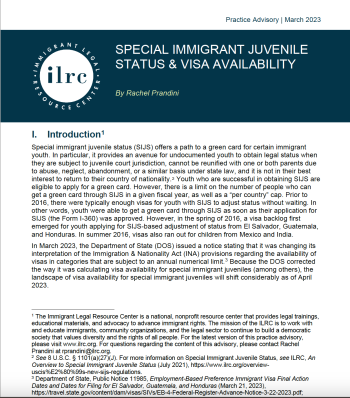
In this resource – updated to reflect significant changes to the Visa Bulletin that will impact special immigrant juveniles beginning in April 2023 – we discuss the visa backlog for youth applying for a green card through special immigrant juvenile status (SIJS). We discuss how to determine when your client may apply for a green card and provide practice tips for representing youth seeking SIJS who may face a long wait before they are able to get a green card.
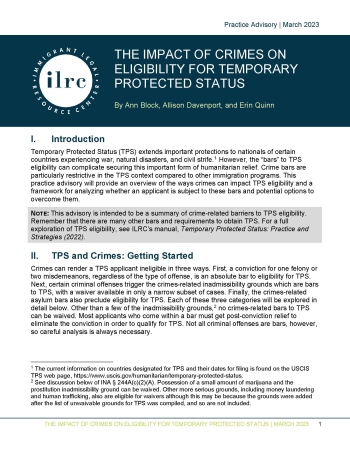
This practice advisory provides an overview of the different ways crimes can impact eligibility for Temporary Protected Status (TPS) and a framework for analyzing whether an applicant is subject to these bars and potential options to overcome them.
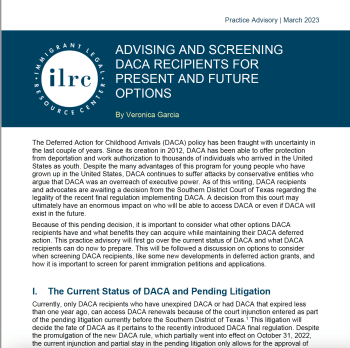
The Deferred Action for Childhood Arrivals (DACA) policy has been fraught with uncertainty in the last couple of years. Despite the many advantages of this program for young people who have grown up in the United States, DACA continues to suffer attacks by conservative entities who argue that DACA was an overreach of executive power, with the most current legal challenge pending in Texas. Because of this, it is important to consider what other long-term options DACA recipients have and what benefits they can acquire while maintaining their DACA deferred action. This practice advisory will first over some options to consider when screening DACA recipients, like some new developments in deferred action grants, and how it is important to screen for parent immigration petitions and applications.
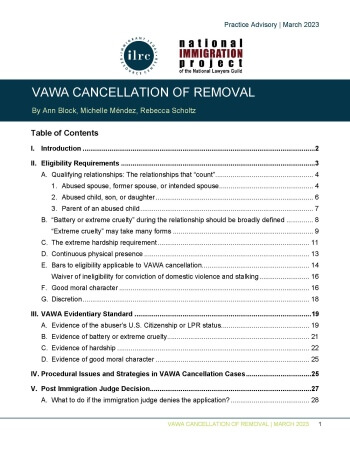
Cancellation of removal under the Violence Against Women Act (“VAWA”) is an often overlooked form of relief for noncitizen survivors of abuse who are faced with removal proceedings. Compared with cancellation of removal for nonpermanent residents (“non-LPR cancellation”), VAWA cancellation is usually a more generous, lenient option for many survivors. In addition, unlike spouse self-petitions, there is no deadline to apply for cancellation after a divorce or loss of immigration status by the abuser, and abused adult sons and daughters are eligible for cancellation without age or marital limitations. This practice advisory introduces and provides an in depth review of each eligibility requirement for VAWA cancellation, discusses the applicable evidentiary standard, and considers procedural issues and strategies useful in immigration court as well as issues arising after an immigration judge issues a decision. Included in this practice advisory is an appendix with a side-by-side comparison of three forms of immigration relief often available to survivors in removal proceedings: VAWA cancellation, VAWA self-petitioning and adjustment of status, and non-LPR cancellation.
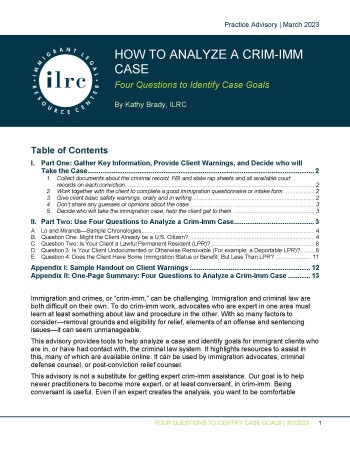
Immigration and crimes, or “crim-imm,” can be challenging. Both immigration and criminal law are difficult on their own. To do crim-imm work, advocates who are expert in one area must learn at least something about law and procedure in the other. It can be hard to know where to start the analysis.
This advisory provides a step-by-step approach to help advocates analyze a case and identify goals. It can be used by criminal defense counsel, immigration advocates, and post-conviction relief counsel. It is not a substitute for consulting with a crim/imm expert, but using it should increase your expertise and help you to better discuss the analysis with the client, argue it to the judge or official, or negotiate with the other side.
This advisory provides a step-by-step approach to help advocates analyze a case and identify goals. It can be used by criminal defense counsel, immigration advocates, and post-conviction relief counsel. It is not a substitute for consulting with a crim/imm expert, but using it should increase your expertise and help you to better discuss the analysis with the client, argue it to the judge or official, or negotiate with the other side.
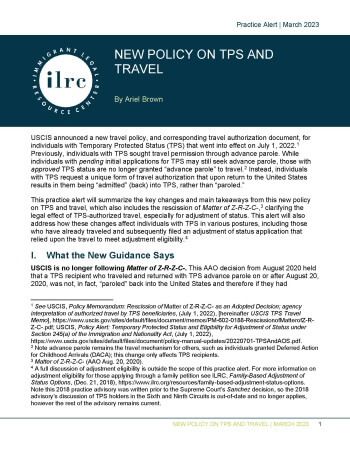
This practice alert provides an overview of USCIS’s new policy on TPS travel, including a new travel document specific to TPS holders that replaces advance parole, rescission of Matter of Z-R-Z-C-, and clarification of the legal effect of TPS-authorized travel, especially for adjustment of status.
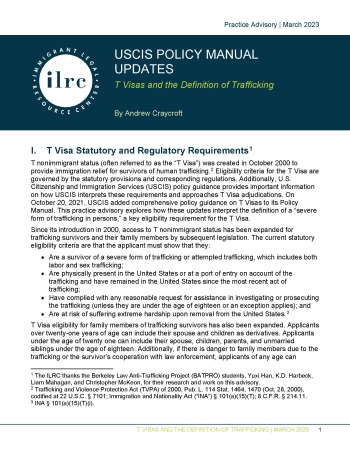
U.S. Citizenship and Immigration Services (USCIS) policy guidance provides important information on how USCIS interprets these requirements and approaches T Visa adjudications. On October 20, 2021, USCIS added comprehensive policy guidance on T Visas to its Policy Manual. This practice advisory explores how these updates interpret the definition of a “severe form of trafficking in persons,” a key eligibility requirement for the T Visa.
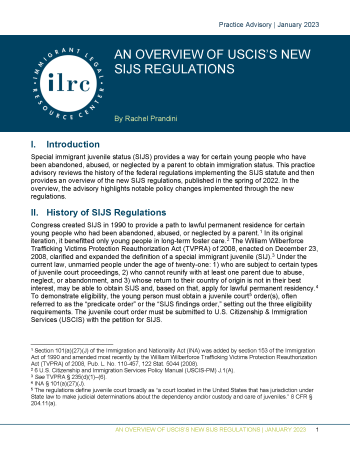
Special immigrant juvenile status (SIJS) provides a way for certain young people who have been abandoned, abused, or neglected by a parent to obtain immigration status. This practice advisory reviews the history of the federal regulations implementing the SIJS statute and then provides an overview of the new SIJS regulations, published in the spring of 2022. In the overview, the advisory highlights notable policy changes implemented through the new regulations.
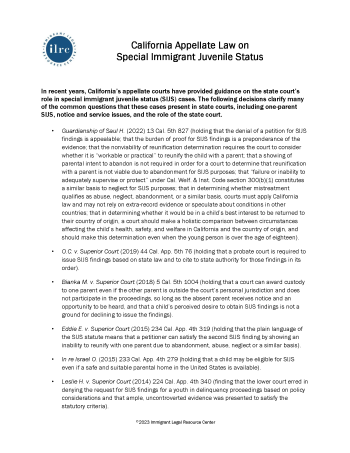
In recent years, California’s appellate courts have provided guidance on the state court’s role in Special Immigrant Juvenile Status (SIJS) cases. The following decisions clarify many of the common questions that these cases present in state courts, including one-parent SIJS, notice and service issues, and the role of the state court
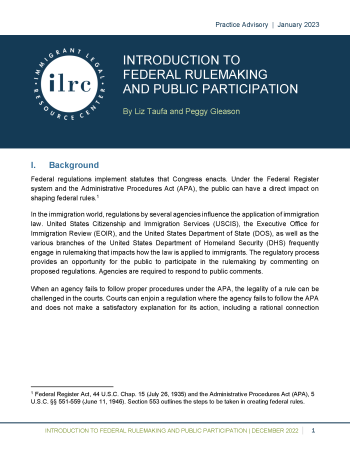
Federal Rulemaking is one of the most direct ways that the public can participate and shape policies and practices of executive agencies. Federal regulations govern the executive agencies charged with enforcing the United States’ immigration laws and granting immigration benefits to eligible applicants. However, the process of Federal Rulemaking is often misunderstood and public participation in the process is under-utilized. This practice advisory provides an overview of the federal regulatory and rulemaking process as well as the authorities that govern this process as well as a guide to commenting on proposed rules and practical tips for navigating the resources available to the public.